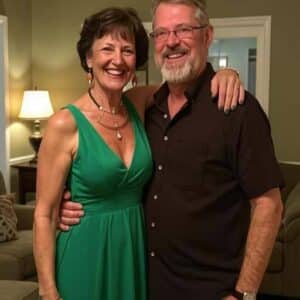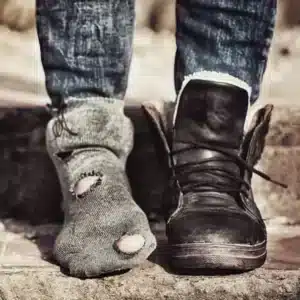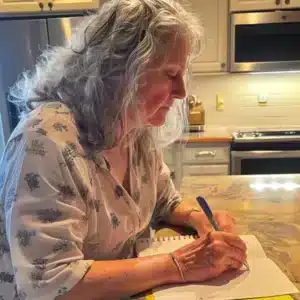We just wanted a quiet anniversary—two nights, no obligations, no alarms. Before we left, we lined everything up for my dad. He still lived in the house he and my mom built, a place with a porch he measured twice and a living room he painted three times for “the right warm white.” He loved that house like people love a person—gently, daily. We asked John’s parents to stay with him. They were retired, eager to help, and said it would be their pleasure.
It wasn’t.
They arrived with smiles and suitcases and acted like landlords by dinnertime. Dad made tea and set out his lemon cookies—the ones he only made on holidays. Janet sniffed, said they were dry, and slid her plate away. Bob opened the fridge without asking and announced they’d need to do “a real grocery run,” like Dad had been foraging in a field. The TV volume climbed, the remote flipped frantically, and every comment sounded like a verdict.
“God, this place is ancient,” Bob said, settling into Dad’s chair with a grunt. “He should install central air.”
“Why does he need a whole house?” Janet added, running a white cloth over an already-clean counter. “He just shuffles around. A care facility would make more sense—nurses, soft food.”
They didn’t bother whispering. Dad took it all in with his usual quiet. He nodded. He poured more tea. He went to his porch and read like he couldn’t hear the verdict being written behind him.
He didn’t raise his voice. He didn’t argue. He watched. He waited.
Three days before we got back, he caught them mid-plan.
“You’re right,” he said calmly from the doorway. “Maybe it’s time I moved out. Would you help me pack?”
Janet brightened like she’d been chosen for a game show. “Of course, sweetheart. You just sit. We’ll handle everything.”
Bob puffed his chest. “We’ll make this place shine again.”
They clinked mugs. She started measuring windows for new curtains. He walked the hallway with a tape measure, already calling the study “the media room.” They boxed Dad’s books and shirts, framed photos and letters, stacking his life in the garage with cheerful efficiency.
“And while you’re at it,” Dad said later, mild as ever, “pack up your room, too. I’m planning to renovate.”
“Sure,” Janet sang. “We’ll move our things to storage.”
Two mornings later, the doorbell rang. A moving truck idled at the curb. Two men in company jackets stepped inside holding a clipboard.
“Pickup for Bob and Janet,” one read. “Cedar Hills Assisted Living. Two residents. Boxes logged.”
Bob blinked. “What? That’s a mistake. We didn’t order anything.”
“Request came from this address,” the mover said, unfazed. “Shared suite. Lovely amenities. Arrival before lunch.”
Janet whirled toward the garage. “Those boxes—are those ours? Did you pack our things?”
Bob pawed at his pockets. “Where are the keys? Where’s our car?”
Dad stepped into the hall with his hands in his pockets and the faintest smile. He looked rested.
“You set us up,” Janet breathed.
“I figured you’d like your own place,” Dad said lightly. “As for me, I’m downsizing. A condo—elevator, quiet neighbors. This house? I’m selling it.”
“You can’t,” Bob snapped.
“I can,” Dad answered, even. “It’s mine.”
He didn’t have to raise his voice. “I’m disappointed,” he added, and it landed harder than a shout. “You came saying you’d help. Instead you insulted me in my home and talked like I was furniture to be moved. This house isn’t a museum. It’s where I loved my wife, raised my daughter, and lived a life I’m proud of. You forgot that the minute you walked in.”
Janet crossed her arms. “We were being practical.”
“No,” he said. “You were being selfish.”
They sputtered; the movers waited. No one went to any facility that day—the truck was a favor from Dad’s friend who owned the company—but the point arrived on schedule. Bob and Janet left, faces tight, phones buzzing later with words like petty and dramatic. John didn’t let it slide.
“You embarrassed yourselves,” he told them, no heat, just clarity. “That’s my father-in-law. You had one job—be kind—and you turned it into a land grab. You owe him an apology.”
It took a few days. Then Janet called. Her tone was stiff. “We’re sorry,” she said. “We were out of line.” Bob muttered something you could almost call an apology if you tilted it in the right light. Dad thanked them. He didn’t dwell.
By the time we got home, the house was surprisingly serene. The boxes were still in the garage, neatly labeled. Dad had a list in his pocket: an agent to meet, utilities to shift, a final bouquet he wanted to cut from the garden. He slept in late the next morning. He made lemon cookies and they were perfect.
He told us the rest over coffee. “I heard them on the first night,” he said. “They weren’t wrong about my knees,” he added with a small laugh. “But this house isn’t a burden. It’s a gift. And if I choose to leave it, it will be because I’m ready, not because someone pushed.”
We cleared the guest room that weekend. He toured a condo the following week—a bright one-bedroom with morning light, an elevator, and a garden terrace for a few tomato plants. He signed the lease and signed the listing paperwork the same day. He walked the rooms of the old house one last time, touching doorframes like the shoulder of a friend.
“Your mother wanted that corner warm white,” he said, standing in the living room. “It took us three tries.”
He planted one more flat of marigolds under the window. He labeled the boxes he wanted to keep. He left a note on the kitchen counter for the new owners about which outlet controlled the cranky lamp and when the lilacs bloomed best.
John’s parents called once more. “We’d like to come by,” Janet said. “To help you pack.”
“Thank you,” Dad replied. “A friend is helping. I think it’s better this way.”
He moved two weeks later. The condo was modest and quiet and just right. The first night, he slept without waking. On the second, he wandered out to the terrace in his slippers and watered his tomatoes. He called me and said he could see the sunrise from the kitchen window. I could hear the smile in his voice.
Here’s what I keep from it: help is not a crown you wear, it’s a coat you hang on someone’s shoulders. A house is not a prize to claim, it’s a story to respect. And my father—gentle as rain, steady as oak—taught two people a lesson without ever raising his voice. He drew a line with kindness and kept his dignity on the right side of it.
He sleeps well now. Alone, but not lonely. And when we visit, he walks us to the elevator and tells us about his neighbors and the woman down the hall who trades him basil for marigolds. He still makes lemon cookies. They’re never dry.





